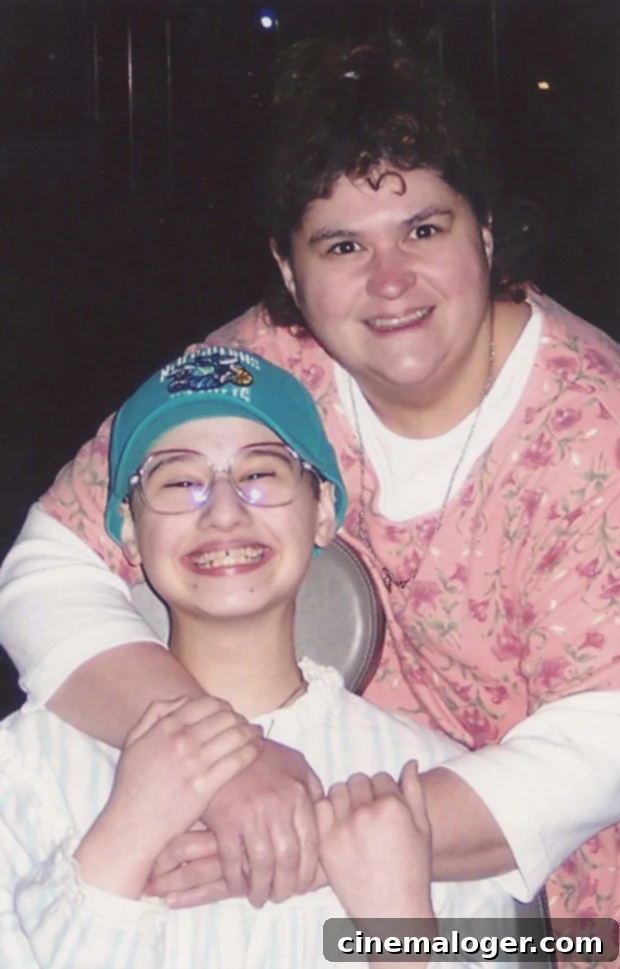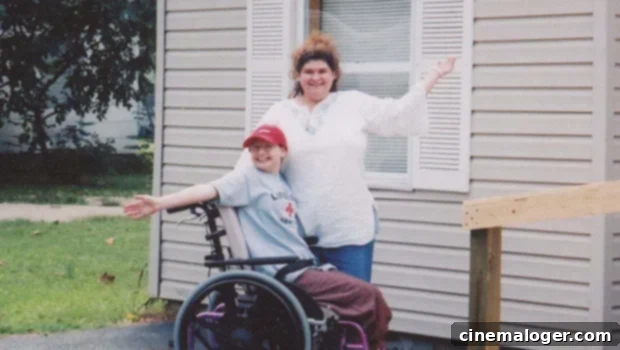Gypsy Rose Blanchard’s Desperate Escape Attempts and the Unraveling of Dee Dee’s Abuse
The highly publicized story of Gypsy Rose Blanchard continues to captivate audiences and ignite crucial conversations around child abuse, manipulation, and the complexities of justice. Recently released from prison after serving time for her role in the murder of her mother, Dee Dee Blanchard, Gypsy Rose has been remarkably open about the years of suffering she endured under her mother’s care. Her candid revelations shed new light on the insidious nature of Munchausen by proxy syndrome and the extreme lengths Dee Dee went to control her daughter’s life, including fabricating severe illnesses and subjecting Gypsy to unnecessary medical procedures.
Among the harrowing details Gypsy has shared is a profound confession: her desperate attempts to escape her mother’s clutches long before the tragic events of 2015. During an emotionally charged interview on The View on Friday, January 5, Gypsy Rose, now 32, revealed that she did try to run away. This disclosure came in response to a poignant question from co-host Sunny Hostin, who inquired why Gypsy hadn’t sought help from authorities or other family members instead of feeling compelled to resort to murder. “I did try to run away,” Gypsy Rose stated, her voice steady but laden with the weight of her past.
This critical detail, previously hinted at, provides essential context for understanding the extreme isolation and psychological torment Gypsy endured. It underscores that the eventual crime was not a sudden act but the culmination of years of failed attempts at self-preservation within an inescapable cycle of abuse. Her efforts to break free were met with severe repercussions, reinforcing Dee Dee’s absolute power and Gypsy’s profound helplessness. The systematic nature of Dee Dee’s control left Gypsy with few, if any, viable options for escape, leading her down a path of increasing desperation.
Gypsy Rose further elaborates on these harrowing escape attempts in the upcoming Lifetime docuseries, The Prison Confessions of Gypsy Rose Blanchard. This series promises an unfiltered look into her life, from her childhood suffering to her time in prison, offering her perspective on events that have long been discussed and debated in the public sphere. Within the docuseries, she recounts a specific instance where she managed to gain some distance from her mother, only for her brief taste of freedom to be brutally extinguished by Dee Dee’s relentless pursuit and overwhelming authority.
She described her first significant attempt to flee with startling clarity: “The first time I tried to run away from home, within four hours—I got as far as the outside of town.” This initial success, however fleeting, quickly turned into a terrifying ordeal. Dee Dee, relentless in her pursuit and control, swiftly located Gypsy and brought her back. The punishment that followed was not merely a scolding but a horrifying demonstration of Dee Dee’s cruelty and determination to keep Gypsy captive, both physically and emotionally. “Within four hours, she brought me back to the home, chained me to the bed, left me there for two weeks without a lot of food, water. I had to urinate on myself or in a bucket as she held the chain,” Gypsy revealed.
This egregious act of physical restraint and deprivation serves as a stark illustration of the severity of the abuse Gypsy faced. It wasn’t just medical fraud; it was outright torture, designed to break her spirit and extinguish any hope of independence. The act of being chained to a bed, denied basic necessities, and forced into such humiliating circumstances speaks volumes about Dee Dee’s complete disregard for Gypsy’s well-being and humanity. Such an experience would undoubtedly leave deep psychological scars, cementing a sense of terror and powerlessness that made any subsequent escape attempts seem utterly futile. This level of punishment instilled a deep-seated fear that would plague Gypsy for years, making any thought of rebellion or seeking outside help feel dangerous and ultimately pointless.

The impact of this punishment was profound and lasting. Gypsy Rose openly admitted that the sheer terror of her mother’s retribution paralyzed her. She continued, explaining that after that brutal experience, she was simply too frightened to consider any further attempts to escape or even to alert external authorities. Dee Dee’s constant presence, particularly during medical procedures—the only exception being the operating room itself—meant Gypsy had virtually no opportunity to communicate her plight to anyone who might help. This created an impenetrable bubble of isolation, meticulously crafted by Dee Dee to ensure Gypsy remained under her absolute control and surveillance. The outside world was a foreign concept, made even more intimidating by her mother’s constant warnings and manipulations.
“I was in the mindset of: ‘I’m so afraid of her. I’m so afraid that if I reach out for help another time, it will be worse for me,’” she articulated, conveying the deep psychological trap she was caught in. This fear wasn’t merely a fleeting emotion; it was an ingrained survival mechanism forged through years of systematic abuse and control. Dee Dee had successfully instilled in Gypsy a terror so profound that it overrode any instinct for self-preservation through conventional means. The threat of amplified suffering, far worse than her current torment, was a powerful deterrent that kept Gypsy compliant and silent, reinforcing the cycle of abuse and control.
The narrative of Gypsy Rose Blanchard is not just a sensational true-crime story; it’s a stark case study in Munchausen by proxy, where a caregiver fabricates or induces illness in a person under their care, often a child, to gain attention or sympathy. Dee Dee’s manipulation extended beyond the medical field; she controlled every aspect of Gypsy’s life, including her education, her social interactions, and even her perceived age and intellectual capacity. This total control meant Gypsy had limited exposure to the outside world, making it incredibly difficult for her to understand her situation or how to seek genuine help. Her mother was her primary source of information, her gatekeeper, and her tormentor, blurring the lines of reality for a young girl who knew no other life. This complete intellectual and emotional isolation further cemented Gypsy’s belief that her mother was her sole protector and authority, despite the abuse.
Since her release from prison, Gypsy Rose has embraced her newfound freedom while also confronting the lingering shadows of her past. She has engaged in multiple interviews, speaking openly about the harrowing abuse she suffered at her mother’s hands. While she has expressed profound regret for her mother’s death, acknowledging the tragic outcome, she also offers a sobering perspective on what her life might have been like had Dee Dee survived. In a CNN interview, she candidly shared her belief that the abuse would have continued unabated. “I think that if my mother were still here, I would still be under this abusive medical abuse that I was going through,” she told the outlet, highlighting the relentless and seemingly endless cycle of torment she faced without any apparent end in sight.
This sentiment reveals the depth of Dee Dee’s control and the pervasive nature of her medical fraud. Gypsy’s belief that the abuse would persist suggests that Dee Dee would never have ceased her manipulations, constantly inventing new ailments and subjecting her daughter to unnecessary surgeries, medications, and invasive procedures. For Gypsy, Dee Dee’s death, however tragic and complex, represented an end to a lifetime of suffering that she believed had no other escape. It underscores the desperate circumstances that led to the unimaginable choices she made, highlighting the profound impact of prolonged abuse on a victim’s psyche and decision-making when conventional avenues for help are completely blocked. The fear of perpetual suffering played a significant role in her actions.
Gypsy Rose Blanchard’s journey from a life of fabricated illness and captivity to newfound freedom is a testament to the human spirit’s resilience, even in the face of unimaginable trauma. Her willingness to share her story, including the previously untold details of her failed escape attempts and the subsequent brutal punishments, is a critical step in raising awareness about Munchausen by proxy and the silent struggles of abuse victims. As she navigates her life post-incarceration, building a future with her husband and connecting with her wider family, her narrative serves as a powerful reminder of the devastating consequences of unchecked abuse and the complex path to healing and self-discovery. Her candor contributes significantly to understanding the victim’s perspective in such intricate cases.
Her story continues to evolve, drawing attention to the broader implications of child abuse and the need for more robust systems to identify and intervene in such cases. The public’s fascination with Gypsy Rose is not just morbid curiosity; it reflects a collective desire to understand how such atrocities can occur and to ensure that lessons are learned to prevent future tragedies. Through her docuseries and ongoing interviews, Gypsy is transforming her personal tragedy into a platform for advocacy, offering hope and a voice to others who may be suffering in silence. Her narrative is a poignant exploration of survival, regret, and the challenging road toward a genuine, independent life, finally free from the chains of her past.
